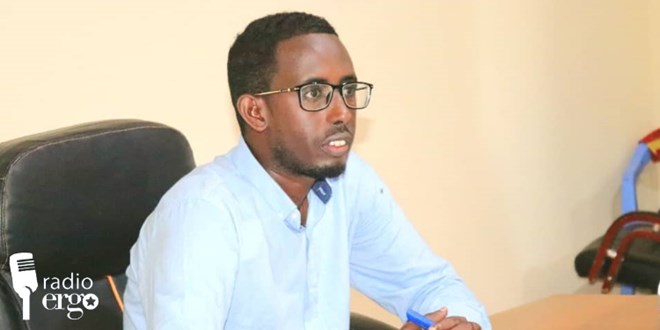
Wednesday November 30, 2022

The chairman of the Somali teachers’ union in his office in Mogadishu/Rijaal Abdi/Ergo
(ERGO) – Ahmed Abdullahi Mohamud, a father of four, has been teaching in a private school in the Somali capital, Mogadishu, for seven years and despite the rising living costs his salary has never increased.
He takes home $120 a month, spends half of that on rent for his small house, and the rest on food and basic necessities for his family, who eat just one meal a day. He is always worried about how he will afford medical care if any of children falls sick.
“Somali teachers are different from other teachers in the world. Somali teachers face various difficult issues. As for me, sometimes I am unable to pay the house rent, then I have to get loans to get by,” Ahmed said.
In privately owned schools, students pay an average of $10-15 tuition fees. In public schools, teachers earn even less. Ahmed teaches eight classes a day from 7:00 am to 5:00 pm and then takes private tuition classes to earn an extra $30.
Ahmed says he has been looking for other better paying jobs outside the education sector, but has not found any opportunities.
“We the teachers in Banadir region are facing challenges; the least paid teachers are those teaching geography, history, and Arabic. Everyone who gets some money opens a learning institution and they don’t pay the teachers well, and that weighs down on the teachers,” he said.
Some teachers move outside the city to cut down on expenses. Although the house rent is relatively cheaper in the outskirts of the city centers transport becomes a challenge for Somali teachers.
Mohamed Hassan Abdulle teaches Arabic and Islamic classes at a primary school in Hodan district, Banadir. He earns $100 a month and struggles to support his family of four children.
He told Radio Ergo that the school made it clear that they will not increase the teachers’ pay. To make ends meet, he had to move house to a cheaper location that means longer commuting time to the city.
“With my meagre income I couldn’t afford to continue paying rent and I had to relocate my family to the outskirts of Mogadishu. It takes me two hours every day now travelling between my house and the school,” he said.
“When the food prices rise it’s possible to pay the electricity and water bills. Our situation is very difficult, the school never increases our salaries. The government doesn’t have programmes for teachers.”
Mohamed, like many disgruntled teachers, says he has no other skills to make an income in another type of job.
Many teachers have complained to the teachers’ association and the ministry of education about poor pay and working conditions but they have not received any response.
The chairman of the Somali national teachers’ union, Abdinasir Salad Mohamed said there are an estimated 30,000 teachers working across the country and the majority are underpaid. The union has met with government officials but there has been no reform in teachers’ remuneration.
“Teachers work long hours and they take home very little. Also, teachers are quickly replaced if one of them falls sick or encounters some other issue,” Abdinasir said.
In a survey conducted by the teachers’ union, it was found that many teachers have dropped out of the profession because of dissatisfaction over pay.